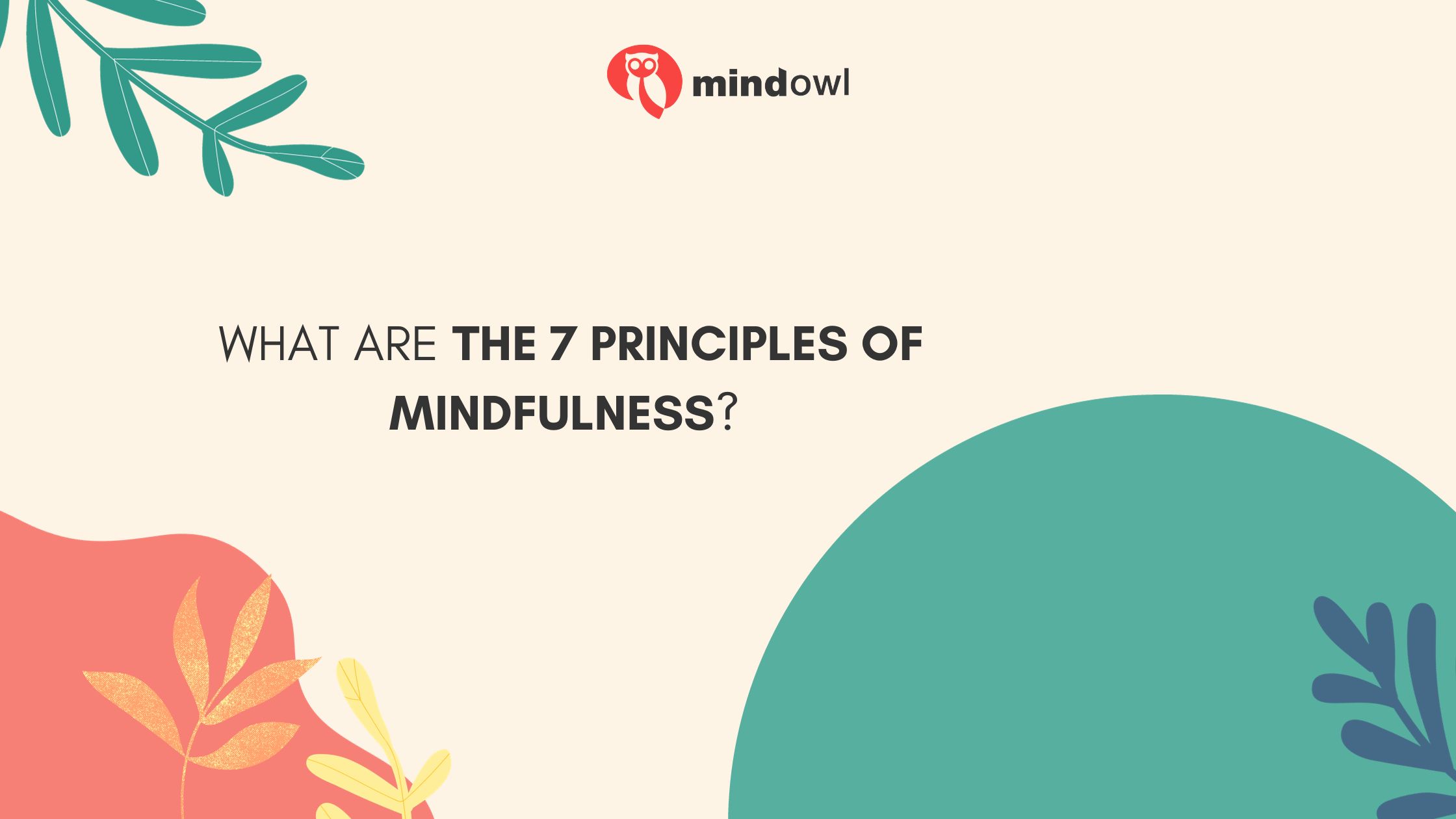
In a world brimming with distractions and stress, finding inner calm can seem like an elusive quest. The practice of mindfulness holds the key to unlocking that tranquility, offering a haven of clarity and focus.
This article unveils the seven core principles that form the backbone of effective mindfulness practice, providing valuable insights to help soothe your busy mind. Discover simplicity and peace as we explore these transformative tenets together.
Key Takeaways
- Mindfulness practice involves seven essential principles: non-judging, patience, beginner’s mind, trust, non-striving, acceptance, and letting go.
- Non-judging encourages observing thoughts without criticism or bias to foster self-awareness and understanding.
- Cultivating patience in mindfulness allows individuals to appreciate the present moment and reduce stress by accepting experiences as they unfold.
- Embracing a beginner’s mind enables openness to learning without preconceptions or judgments, fostering curiosity and breaking free from habitual thought patterns.
Understanding the Seven Principles of Mindfulness

The seven principles of mindfulness are essential attitudes that form the foundation of a mindfulness practice. These principles include non-judging, patience, beginner’s mind, trust, non-striving, acceptance, and letting go.
Each principle plays a vital role in cultivating mindfulness and living in the present moment.
Non-judging
Being mindful means looking at your thoughts and feelings without judging them. You do not decide if they are good or bad. Instead, you notice them with kindness. Jon Kabat-Zinn talks about this in “Full Catastrophe Living.” He says that judgement often makes stress worse.
By not judging, we can see things more clearly and help ourselves find peace.
Mindfulness trains us to be kind and patient with ourselves. When we practise non-judging, it’s like giving our minds a break from deciding how we should feel or react every moment.
This is one of the key attitudes of mindfulness that lets you be present in the moment without pressure or stress. It helps build a strong meditation practise where being calm and receptive becomes natural.
Patience
Moving from the practice of non-judging, we find that patience is another key part of mindfulness. Patience means you understand things need time to develop. Just like seeds need time to grow into flowers, your mind needs time to find peace.
Mindfulness asks you to give yourself this time without getting upset or rushing.
Patience helps when you feel stuck or frustrated in life. It tells you it’s okay if change doesn’t happen right away. With patience, you learn to wait calmly and not force things. This can make your mind calm and strong.
And when your mind is calm, dealing with tough times gets easier. You begin to see that waiting can often be as important as the end result.
Beginner’s Mind
Beginner’s Mind means seeing the world through fresh eyes. Imagine looking at things as if it were your first time, every time. This principle helps us to notice new details and not get stuck in old ways of thinking.
It encourages a love for learning and discovery, just like when we were kids.
Having a Beginner’s Mind also helps you let go of what you think you know. You become more open to experiences and stop judging everything as either good or bad. This way, your mind stays clear and ready to explore whatever comes next.
Trust
After embracing a beginner’s mind, mindfulness asks you to place trust at the forefront of your practice. Trusting yourself is essential in this journey. It means believing in your own wisdom and listening to your feelings.
This principle guides you away from harsh self-criticism when things don’t go as planned. Acknowledge that making mistakes is normal and being kind to yourself during those times builds resilience.
Mindfulness requires trust not only in ourselves but also in the process itself. It can feel strange not trying to control everything, yet it’s vital for growth. As one of the seven pillars of mindfulness, trusting lets you experience life more fully.
You let events unfold naturally without forcing them, learning that patience truly complements trust, as both allow experiences to emerge in their own time.
Non-striving
Trusting your journey in mindfulness leads to embracing non-striving, which is about not forcing things. You learn to take a step back and let life happen without pushing too hard to make something specific occur.
Non-striving means letting go of the urge to get somewhere or change how things are right now. It’s simply being with your current situation, feeling what you feel, and thinking what you think without trying to turn it into anything else.
In mindfulness practice, this attitude helps calm your anxious mind because it removes the pressure of needing certain results from your actions. Embrace non-striving by paying attention to your breath and allowing thoughts and feelings to come and go freely.
This technique can improve mental and physical health by reducing stress that builds up when we want things to be different than they are. Mindfulness exercises encourage us not just to witness our experiences but also find peace in the present moment exactly as it unfolds.
Acceptance
Moving from the idea of non-striving, we find another crucial principle to consider: acceptance. Acceptance teaches us to see things as they really are, not how we want them to be.
It’s about understanding and embracing what is happening right now in our lives. This doesn’t mean you give up or agree with everything; rather, it means acknowledging your current situation without trying to change it immediately.
Embracing acceptance helps you deal with life’s challenges more calmly. When you accept things, you stop fighting against the reality of your experiences which can reduce stress significantly.
By recognising and accepting your feelings and thoughts as they come, mindfulness becomes more powerful. You learn not just to live with difficult times but also to approach them with a clearer mindset that aids better decision-making.
Letting go
Just as acceptance is about seeing things as they are, letting go involves the release of any tension or resistance we may feel. Mindfulness teaches us to let thoughts and feelings pass without getting stuck on them.
This can help reduce stress as we learn not to hold onto worries or discomfort. We can witness thoughts like clouds moving across the sky – noticing them but not attaching our emotions to them.
Embracing this mindfulness principle means making space for new experiences and insights. It’s about trusting that life will unfold in its own time, allowing ourselves to let go of the need for control.
When we stop clinging to what we want or fear, we open ourselves up to a greater peace and understanding of the world around us. Letting go helps clear away mental clutter so that we can see more clearly and make better choices in our lives.
The Importance of Non-judging in Mindfulness Practice
 Non-judging is a crucial aspect of mindfulness practice because it encourages us to observe our thoughts, emotions, and experiences without criticism or bias. Instead of categorising things as good or bad, we acknowledge them as they are, fostering self-awareness and understanding.
Non-judging is a crucial aspect of mindfulness practice because it encourages us to observe our thoughts, emotions, and experiences without criticism or bias. Instead of categorising things as good or bad, we acknowledge them as they are, fostering self-awareness and understanding.
This principle allows us to break free from automatic reactions and reduces the impact of negative self-talk, promoting emotional resilience and mental well-being. By practising non-judgmental awareness, we can cultivate a more compassionate outlook towards ourselves and others while embracing the present moment with greater clarity.
How the Principle of Patience Can Help in Cultivating Mindfulness
When we transition from the non-judging aspect of mindfulness to patience, it’s essential to understand that cultivating patience is crucial in deepening one’s practice. Patience is not merely waiting; it involves maintaining a sense of calmness and self-control amidst difficulties.
In mindfulness, patience means being open to witnessing the unfolding of experiences without wanting to hold onto or control them. Cultivating patience through mindfulness can help individuals appreciate the present moment rather than constantly seeking future outcomes.
Moreover, by accepting things as they are and allowing them to unfold in their own time, individuals can enhance their ability to stay grounded and peaceful amidst life’s challenges, ultimately leading towards stress reduction and a greater sense of inner peace.
Beginner’s Mind: Approaching Life with Curiosity and Openness
Approaching life with curiosity and openness is a key principle of mindfulness. Beginner’s mind means seeing things as if for the first time, like a child full of wonder. It involves being open to learning without preconceptions or judgements.
This attitude allows us to let go of assumptions and approach situations with fresh eyes, enabling us to see opportunities where we might have seen obstacles before.
Cultivating a beginner’s mind can help us appreciate the richness of life and be more present in the moment. By embracing this attitude, we become willing to see everything as if for the first time, which opens up new possibilities and helps us break free from habitual thought patterns.
Just like how trusting oneself and one’s feelings are important aspects emphasised in mindfulness training, adopting a beginner’s mind enables us to navigate our experiences with an open heart and an uncluttered mind.
By approaching each moment with curiosity instead of judgement, we allow ourselves the freedom to explore without constraints while fostering a sense of wonder that brings freshness into every aspect of our lives.
Trusting the Process: Letting go of Control in Mindfulness
Trusting the process in mindfulness involves developing faith in oneself and one’s feelings. It allows individuals to let go of unnecessary control, fostering a greater sense of peace and acceptance.
When people trust themselves and their instincts, it frees them from needless stress and anxiety. Letting go is another vital aspect, encouraging individuals to pay attention to their inner experiences and release unnecessary control over situations.
Incorporating these core principles can be beneficial for managing anxiety and enhancing recovery journeys.
Incorporating trust and letting go as part of the seven essential attitudes of mindfulness provides a foundation for living mindfully. These attitudes support each other, creating a way of living that nurtures inner peace and self-acceptance while paving the way for personal growth.
The Power of Non-striving, Acceptance, and Letting go in Mindfulness Practice
In mindfulness practice, non-striving, acceptance, and letting go play a crucial role in fostering inner peace and mental clarity. The principle of non-striving encourages us to be present in the moment without trying to change anything, allowing us to cultivate a sense of contentment with things as they are.
Acceptance involves acknowledging our current situation without judgment or resistance, promoting a deeper understanding of ourselves and others. Letting go teaches us to release attachment to thoughts and emotions, enabling greater emotional resilience and freedom from distress.
These attitudes work together harmoniously, offering a pathway towards self-discovery and profound serenity.
The power of non-striving, acceptance, and letting go in mindfulness practice is evident through their ability to alleviate stress and enhance overall well-being. By embracing these principles, individuals can navigate life’s challenges with greater ease while nurturing compassion for themselves and others.
This approach fosters an environment where one can experience the richness of each moment fully without being hindered by preconceived notions or fears about the future. Embracing these foundational aspects of mindfulness empowers individuals to lead more fulfilling lives marked by authenticity and tranquility.
Conclusion
In conclusion, the seven principles of mindfulness form the foundation for a balanced and fulfilling life. Trusting in oneself, practicing non-judging, and cultivating beginner’s mind can lead to inner peace and well-being.
By embracing these essential attitudes, one can learn to let go of attachments, practice patience, and acknowledge experiences without judgment. These principles offer a pathway to navigate life with clarity and compassion while fostering personal growth and mental resilience.
Embracing these core tenets can lead to a more peaceful and meaningful existence.
FAQs
What are the 7 principles of mindfulness?
The seven principles of mindfulness are essential concepts that form the foundations of mindfulness practice. These principles include non-judging, patience, beginner’s mind, trust, non-striving, acceptance, and letting go.
What are the attitudes of mindfulness?
The attitudes of mindfulness refer to the mental stances and approaches that individuals can cultivate to deepen their mindfulness practice. These attitudes include non-judging, patience, beginner’s mind, trust, non-striving, acceptance, and letting go.
Who is Jon Kabat-Zinn and what is his contribution to mindfulness?
Jon Kabat-Zinn is a renowned scientist, author, and meditation teacher who is widely recognized for his role in bringing mindfulness into mainstream medicine and society. He is the founder of the Mindfulness-Based Stress Reduction (MBSR) program, which has played a pivotal role in integrating mindfulness into the fields of healthcare and wellness.
What are the pillars of mindfulness?
The pillars of mindfulness encompass the fundamental aspects of mindfulness practice. They include cultivating present moment awareness, practicing non-judgmental acceptance, and developing a non-striving attitude. These pillars provide a guiding framework for individuals seeking to integrate mindfulness into their daily lives.
What are the 9 attitudes associated with mindfulness?
A: The 9 attitudes associated with mindfulness are non-judging, patience, beginner’s mind, trust, non-striving, acceptance, letting go, gratitude, and generosity. These attitudes serve as guiding principles for individuals engaging in mindfulness meditation and embodying mindfulness in their daily activities.
What is “full catastrophe living” in the context of mindfulness?
“Full Catastrophe Living” is a term popularized by Jon Kabat-Zinn in his book of the same title. It refers to the practice of embracing life in its entirety, including both its positive and challenging aspects, as a central component of mindfulness-based approaches to well-being.
What are the major pillars of mindfulness practice?
A: The major pillars of mindfulness practice include cultivating present moment awareness, practicing non-judgmental acceptance, letting go of attachment, developing a non-striving attitude, and nurturing a sense of trust in oneself and the unfolding of experiences.
How is mindfulness cultivated by assuming the power of mindfulness?
Mindfulness is cultivated by assuming the power of mindfulness through intentional and sustained practice. This involves engaging in mindfulness meditation, developing present moment awareness, and consistently embodying the attitudes of mindfulness in daily life.
How does mindfulness help people find peace?
Mindfulness helps people find peace by enabling them to cultivate a profound sense of present moment awareness, observe their thoughts and emotions without attachment or judgment, and develop an acceptance of circumstances as they are, thereby fostering inner peace and contentment.
What does acceptance mean in the context of mindfulness?
Acceptance in the context of mindfulness means seeing and acknowledging experiences, thoughts, and emotions as they arise without resisting or trying to change them. It involves embracing the present moment with openness and compassion, fostering a sense of inner peace and well-being.
MindOwl Founder – My own struggles in life have led me to this path of understanding the human condition. I graduated with a bachelor’s degree in philosophy before completing a master’s degree in psychology at Regent’s University London. I then completed a postgraduate diploma in philosophical counselling before being trained in ACT (Acceptance and commitment therapy).
I’ve spent the last eight years studying the encounter of meditative practices with modern psychology.


